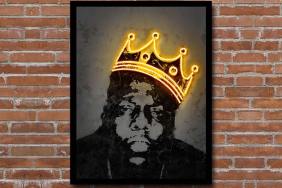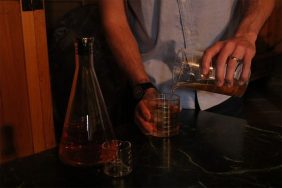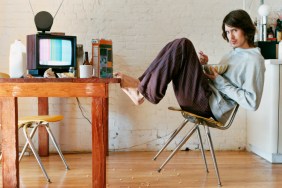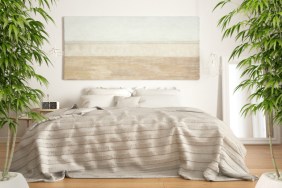If you are of a certain age, you’ll remember a time when the home bar was relegated to the basement. It was rugged, uncoordinated and certainly not meant to impress anyone outside of the fact that alcohol was served there. Now, bars are sought-after additions to modern homes, and they aren’t hidden away in a dingy basement.
John Sofio, founder of Built, Inc., has a few pointers for those who want to bring the elements of their favorite bar home. His company is the hospitality design group behind California venues like The Nice Guy, the Ivory on Sunset, and Bootsy Bellows. He recently pimped out Delilah, a new “super celebrity-driven space” in West Hollywood, with a modern, Art Deco vibe.
So read on and study up because, trust us, the day will come when you can’t (or won’t want to) leave the house, not even for a drink.
Placement
First things first: where do you build a bar, if not in the basement? Unequivocally, in the living room. “It’s not a big drinking society anymore in terms of having your liquor on display, but when people do have an event, it’s nice to have a gathering place to go from,” Sofio says.
When he built a home bar for an executive in West Hollywood, Sofio positioned it in an awkward, “dead” corner near the entrance of the space. Because the house was heavily recto-linear, the designer stationed the bar at a 45-degree angle so that it opened up to the room. “It’s a great statement for that space,” he says.
Also: The Twenty Best Bars in America
Though Sofio doesn’t drink much, he still built a small bar peninsula in his own home. It comes off the wall in the den area by the pool table and boasts a “really, really beautiful” Calacatta Gold marble top.

Wood from the Queen Mary inspired the decor at Delilah.
Seating
When it comes to seating, go low. At Delilah, Sofio lowered the bar from the standard 42 inches to 39 ½ inches, sunk the area behind the bar by 2 inches, and brought in lower bar stools. “It gives a really elegant, residential feel as opposed to some of these really tall bars where everyone’s standing,” he says.
As for what your guests should sit on? Sofio’s clients are lucky in that his company creates all of its own furniture, from banquettes to couches. He believes personality in the furniture should shine through the furniture’s frame, arms, legs, trim, or tufting, not through the fabric. “It’s all about the architecture of the piece,” he says. Look for pieces that are both unique and timeless, and avoid knock-offs. If your bar is a high-traffic area, make sure you pick durable furnishings.

Balance light and dark, bold colors and wood.
Colors
Contrary to popular belief, darker is not necessarily the norm when it comes to bar colors. As part of his design process, Sofio likes to do research. For Delilah, he went to the Queen Mary, an ocean liner docked in Long Beach, Calif., to study the veneers and woods used in the ship’s design. A chart revealed 50 types of woods were used in its construction; that inspired Sofio to layer the veneers in the Delilah project. He used rift cut white oak for the backbar wall, layered it with alder-stained English cherry red, and used mahogany with a clear coat for the base of the bar.
“I’m getting this tonality of woods; they’re all pretty close in finish but because each one takes each stain differently, it’s going to have this beautiful, layered furniture effect,” Sofio says.
He then juxtaposed the warm woods with a dark floor and a white ceiling. With low lighting, the space will have an amber glow. “It’s a matter of sculpting the light and balancing it with what you’re reflecting the light off of,” Sofio explains.
As for colors and fabrics of furnishing, Sofio prefers sticking to solids. Pink and emerald hues dominate in the Delilah space.

Do not fear traditionally feminine hues like pink.
Luxury Touches
When crafting Delilah, Sofio used built-in lamps, brass strip inlays, and a deep pink quartzite to give the bar top a glamorous feel. The edge of the bar was designed to be soft and sexy, something guests can lean on while chatting up their neighbors. Mirrors are lined along the booths.
Sinks
Keep your home bar sink as minimal as possible. A custom trough sink, measuring 8 inches wide by 16 inches long, is a space-saving choice that doesn’t distract from the beauty of your bar. A bar sink’s purpose is to drain or to act as an ice well; it’s not meant for dish-washing. You have a full-sized kitchen (and hopefully a dishwasher) for that.
Artwork
The bar is one of the few areas of the home where it’s okay to eschew artwork. As Sofio says, “The bar itself is the art piece.”
Photos: Elizabeth Daniels.








